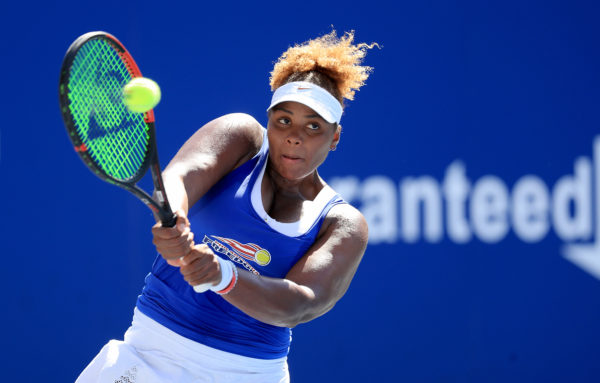Just weeks after Naomi Osaka shocked fans after withdrawing from the French Open, citing concerns over her mental health, another athlete has revealed how she says the sport affected her well-being.
The tennis world has been called out for many off-putting things, including being a sexist, rich white man’s sport, and now tennis star Taylor Townsend is calling out the game for what she considers to be fatphobia. In 2012, the then 16-year-old became the number one junior girl’s tennis player. Still, in a newly released article by the now 25-year-old for The Players Tribune, Taylor candidly explained how the U.S. Tennis Association allegedly tried to end her career over her weight.

“That’s where this story starts. I’m 16, I’m coming off some great results, and I’m only a few weeks from the U.S. Open. And then… I get this phone call,” the Chicago native began. “It was an official from the USTA. (That’s like being called to the principal’s office.) They said, ‘Taylor, you need to come to Florida — now. We’re putting you on an eight-week block of fitness training.’ I didn’t even have to do the math. I heard “eight weeks,” and my stomach just dropped.”
Townsend explained that an eight-week trainer meant she wouldn’t be able to participate in the U.S. Open. However, it wasn’t the first time the topic of her weight had been brought up for discussion. Still, Taylor went along with it and took a brief hiatus to work on her health, admitting that “conditioning wasn’t an area of strength for me that summer.” And just as she began her training, she was pulled away for discussion regarding her health.
“ ‘Dang, I just can’t catch a break. What’s wrong now??’ ” Townsend recalled thinking to herself. It was then she was told by doctors she was anemic. “As in — I’d been under serious cardiovascular stress for who knows how long. I’d been playing sick, man. That’s what had been going on with me,” she explained. “Figuring that out was scary….. but in a way, it was also a relief at the same time?? Because it was kind of just like — okay, now we know. It’s not a fitness thing. It’s a health thing. And now we’re aware of it, and we’re about to take care of it, and….. yeah, I’ll say it: Now I can go to the Open.”
However, when she told the organization about her diagnosis, the athlete says she was met with pushback, and was told, “you’re simply not fit to play,” which made her really ponder what “fit to play” actually meant. The whole ordeal left the athlete confused and hurt. She thought her ranking would mean something. “Doesn’t exactly work that way, though, does it. As a matter of fact….. it worked pretty much exactly the opposite. It worked the way things usually work in a country that hates fat Black women,” she wrote. “I was fat, and I was Black, so they took away my dream. Or at least they tried.” Due to her ranking, the association couldn’t stop her from playing juniors. However, they could stop her from getting the funding she needed to attend.
At the time, Patrick McEnroe, a general manager of the USTA’s player development program, told the Wall Street Journal’s Tom Perrotta, “our concern is her long-term health, number one, and her long-term development as a player.” He added, “We have one goal in mind: For her to be playing in [Arthur Ashe Stadium] in the main draw and competing for major tiles when it’s time. That’s how we make every decision based on that.”
Townsend went to the tournament anyway, minus the support from the association, with her mother footing the bill on travel costs. That year she won the junior doubles title and advanced to the quarterfinals in the singles division. When asked by reporters why she wasn’t playing with the pros, the athlete decided to tell her truth about her experience with fatphobia in the sport and, as a result, was punished.
“But it turns out that 16-year-old Black girls can’t take public shots at the biggest organization in American tennis and then simply go back to their business. Reporters started coming around for interviews,” she explained. “USTA officials came out to “clear things up.” Somehow they got my mom involved. It’s like stuff just kept spiraling out of control. Like it went from not a thing, to barely a thing, to a THING, to a situation, to almost this like National Incident, so damn fast.” Townsend says the whole incident took a toll on her mental health, ultimately leading to her leaving the association.
Now at 25-years-old, Townsend is a new mom to a baby boy name Aydn Aubrey Johnson and while it may sound cliche, she believes that being a parent has given her a fresh outlook on life and she realized that she’s not alone in her story.
…”there’s also hundreds (thousands?!) of stories you’ll probably never even hear about, of Black girls who just didn’t get a shot, she said. Whether that’s because of money….. or racism….. or lack of support….. or gatekeeping bullsh-t….. or because the system just kind of failed them, the way it fails so many Black women, all the f–king time….. and whether their dream ended in the pros, or in college, or in high school or grade school or — real talk — maybe they never got to pick up a racket at all. There’s just got to be so many stories out there of Black women that never got their chance. And then somewhere in there, somewhere else within that mess of stories, you’ve got mine.